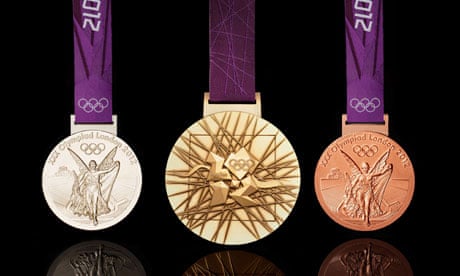The British mining company that provided the gold, silver and bronze for London 2012 Olympic medals is being sued over claims of "illegal air pollution" at the open pit mine that produced the Olympic metals.
Doctors, environmentalists and concerned citizens are suing the London-based mining company Rio Tinto in a case that starts on Tuesday. They allege the £60bn company violated clean air laws at the US mine that produced 99% of the metals used in the 4,700 Olympic and Paralympic medals.
The lawsuit filed at Utah district court against Rio subsidiary Kennecott claims the Bingham Canyon mine, near Salt Lake City, has breached air pollution laws for five years causing effects doctors called "similar to smoking 20 cigarettes a day".
Utah Physicians for a Healthy Environment (UPHE), one of the groups of claimants, said dust from the mine can be "absorbed into the bloodstream, causing respiratory system damage, adverse pulmonary [heart and lungs] effects and potentially even premature death".
The claimants, which also include Utah Moms for Clean Air and environmental group Wildearth Guardians, say the mine has been "emitting particle matter at levels in excess of those allowed by the US Clean Air Act" for at least five years. Rio Tinto denies the claims.
Claimants allege emissions from the mine, known locally as the "biggest man-made hole on Earth", are a "major health threat to citizens living along the Wasatch Front [the northern part of Utah including the cities of Salt Lake City, Provo and Ogden]".
The boss of Rio Tinto − which made $4.2bn (£2.6bn) profit in the first half of this year − had said the medals were made of some of the most ethically and environmentally friendly metals ever sourced.
Tom Albanese, who was CEO of Rio Tinto until earlier this year, said when the company won the London 2012 contract: "Being ethically responsible is a thread that runs through everything we do. We aim to bring long-lasting positive change to the communities where we work, respecting human rights, bringing economic benefits and looking after the environment … We have rigorous standards for air quality, ecosystems, biodiversity, climate change, the use of energy, land and water and waste disposal."
The metals used in the medals, which weighed 14 oz (397g) each, were nearly all sourced from Bingham Canyon. The company refined 44kg of gold, 6 tonnes of silver and a couple of tonnes of copper to make the medals. Bronze is an alloy of copper, zinc and tin. Tin was added from mines in England and Australia.
Rio Tinto donated the metals, worth $7.3m, to London 2012 organisers in return for publicity rights.
The lawsuit claims doctors had been "adversely affected" by the emissions from the mine, owned by Kennecott Utah Copper, a wholly-owned subsidiary of Rio Tinto. "On days with severe particulate matter [pollution] in Salt Lake, doctors have found the effect on people who are consistently outdoors is similar to smoking a pack of cigarettes a day."
UPHE said: "These emissions are offensive to observe, particularly given Utah Physicians' knowledge of the adverse health effects of such pollution and pose a significant threat to health, wellbeing and quality of life.
"Utah Physicians feel ethically obligated to confront this illegal pollution in order to protect the health and welfare of its members, patients, friends, families and communities."
In its defence documents, the company said the mine "complied with the relevant provisions of Utah's particle material [emissions] state implementation plan at all times".
"For over 15 years, Kennecott has operated an ambient air quality monitoring station at Copperton, Utah, which station is located to detect potential particulate matter impacts from Bingham Canyon Mine. This monitoring station consistently shows air quality readings well below the Environmental Protection Agency (EPA) established National Ambient Air Quality Standards (NAAQS)."
Rio Tinto declined to comment on the case on Monday night.
